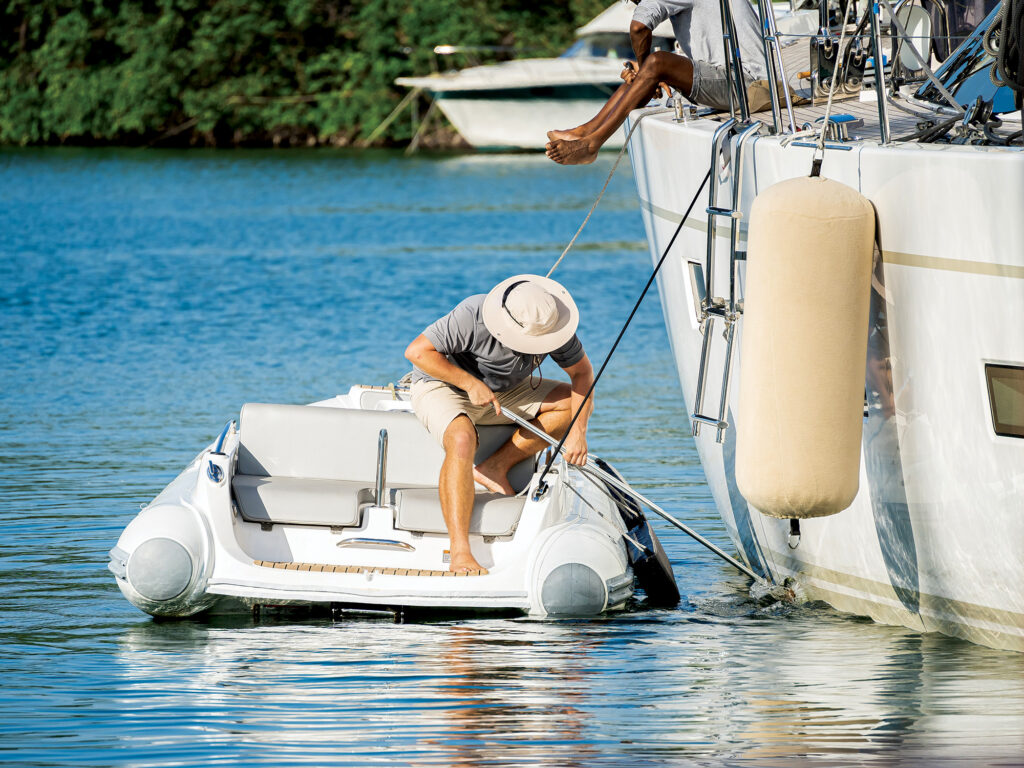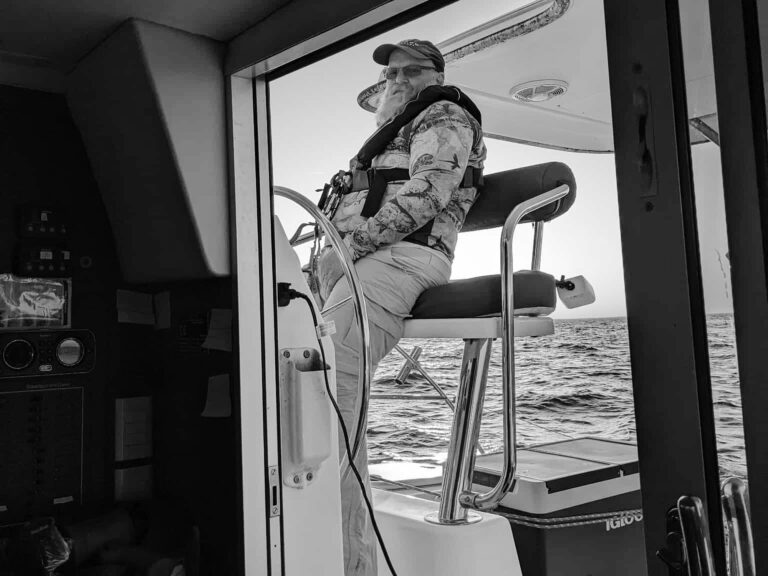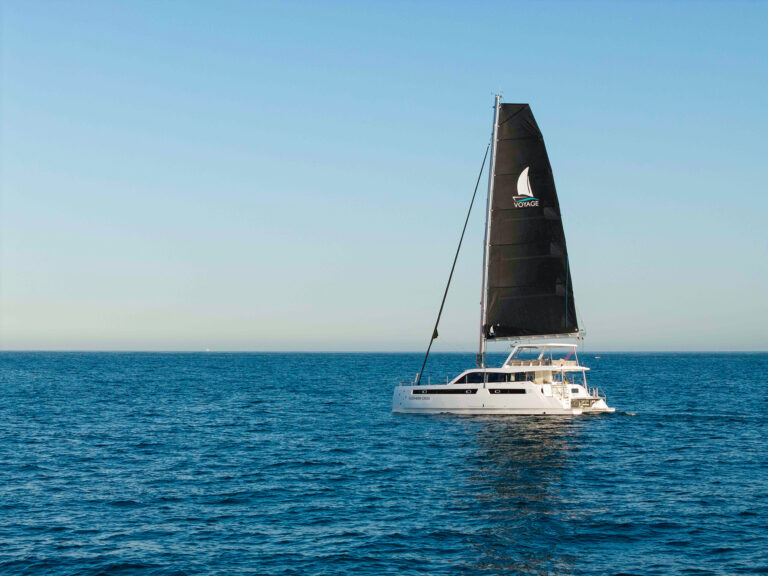
For many sailors, the dream of owning a yacht in the Virgin Islands is as picture-perfect as the Caribbean itself. But for some, that dream is also a strategic move that blends lifestyle, business and, in some cases, tax-smart investing. Crewed charter-yacht ownership can be a viable path to spending real time on the water while defraying the costs of boat ownership.
Cruising World Editor-in-Chief Andrew Parkinson sat down with charter expert and BVI Yacht Sales broker Ted Reshetiloff for a deep dive into the world of charter-yacht ownership, based on his personal interactions with client-owners, brokers and charter operators.
AP: Let’s start with the basics. Why would someone choose to own a professionally crewed charter yacht instead of using the boat solely for private enjoyment?
TR: It’s a great question, and one we hear often from potential buyers weighing their options. The truth is, there are a number of compelling reasons why someone might choose the crewed charter model over traditional private ownership—starting with lifestyle and access.
For many people, the idea of owning a 50-plus-foot catamaran is incredibly appealing, but the financial and logistical realities can be a deal-breaker. Purchase price, insurance, dockage and annual upkeep add up quickly. Then there’s the challenge of managing the boat—often located in the Caribbean or Mediterranean—while living thousands of miles away. It’s a full-time commitment that doesn’t align with most owners’ lifestyles.
That’s where the crewed-yacht model offers real advantages. By placing the vessel into a professional charter program with full-time crew, many of those burdens are lifted. Owners can enjoy peace of mind knowing that the boat is being actively maintained and operated by professionals. In fact, we often see better long-term care in crewed yachts than in those that sit idle between seasonal owner visits.
Financially, there’s an upside as well. Most crewed yachts for sale come with existing bookings in place, providing immediate revenue and an established client base. While it’s not a get-rich scheme, the charter income can offset a significant portion of the ownership costs—and in some cases, even generate passive or semi-active income.

But beyond the dollars and logistics, what really motivates many owners is the lifestyle enhancement. Charter ownership offers flexibility, access to a premium yacht, and the ability to share unforgettable experiences with friends and family, all while knowing that your asset is working for you when you’re not aboard. For many, it’s the gateway to a yachting life that they otherwise couldn’t justify or afford.
AP: What do the numbers really look like? How do owners balance personal use with generating charter income?
TR: Once you own a crewed yacht in the Caribbean, the dream starts to take shape. You’re planning your next getaway and imagining anchoring off secluded beaches, with a cocktail in hand. But then comes the real question: How many weeks a year do you actually plan to spend on board? And is this primarily a lifestyle play or a financial one?
Owners need to decide early on how much charter activity they want. Some aim to maximize income, booking 20 or more weeks per season to make the most of high-demand charter windows. Others take a more balanced approach, modeling out their expenses and choosing to charter just enough to offset annual costs while preserving prime weeks for personal use.
Charter rates vary based on the boat, but to give you an idea, a crewed Leopard 50 catamaran can bring in around $25,000 per week for an all-inclusive charter. So, if you’re asking yourself, Is it cheaper to own or to charter? then you need to compare apples to apples. Let’s say you want to spend eight weeks a year sailing the islands. Chartering a comparable crewed yacht for that amount of time could easily cost you upwards of $200,000 annually. But as an owner, those weeks can be paid for by your charter income—and you’re spending them on a professionally crewed, well-maintained yacht that’s yours.
So the financial equation really comes down to how much you use the boat and how you value the lifestyle. For many owners, it’s not just about the numbers. It’s about accessing a level of experience that they couldn’t otherwise justify or afford without the charter model in place.
AP: Are there any tax benefits to owning a crewed charter yacht?
TR: Absolutely—and it’s one of the most important parts of the conversation for US-based buyers. Under the right circumstances, there are several tax strategies that can significantly reduce the cost of ownership, particularly if the yacht is operated as a legitimate business with the intent to generate profit. That said, these benefits are complex and must be carefully structured in consultation with a tax professional who understands maritime assets.
One of the key areas where owners might find advantages is bonus depreciation. This has been one of the most powerful incentives in recent years. If a yacht qualifies as a business asset, owners might be able to depreciate a significant portion of the purchase in the first year. Under the Tax Cuts and Jobs Act, that meant up to 100 percent depreciation, though this percentage has started to phase down. Still, there are signals that it might return to the full deduction under new legislation. To qualify, you must be operating the yacht as a bona fide business.
Another advantage can be the Section 179 deduction. Similar to bonus depreciation, Section 179 allows for the immediate expensing of certain business assets, including—under the right conditions—charter yachts. It’s subject to limits, but it can be a valuable tool for those looking to reduce taxable income early in ownership.
There’s also deductible operating expenses. If the yacht is actively chartered and treated as a business, many ongoing costs might be deductible. That includes dockage, maintenance, crew salaries, insurance, fuel, provisioning, marketing, and even travel expenses related to managing the yacht.
Loan-interest deduction is another possible advantage. If you finance the purchase, the interest on that loan also might be deductible—again, provided the yacht is used for legitimate business purposes. This can ease the financial load, especially in the early years of ownership.
With sales tax, depending on how the purchase is structured and where the vessel is delivered, some owners can defer or even avoid paying sales tax altogether. Some take delivery in tax-advantaged jurisdictions or form ownership entities in states or territories with more-favorable laws.
Also worth noting is that the IRS draws a line between active and passive income. If you’re materially involved in running the charter business, you might be able to offset losses against other active income. If it’s considered a passive activity, the benefits are still there but applied differently.
There’s also the 1031 like-kind exchange. This applies mostly to real estate, but there have been instances where commercial yacht owners have successfully used this strategy to defer taxes when upgrading to a newer vessel. It’s not common, but it’s worth exploring with your CPA if you’re scaling up.
Bottom line: The tax advantages can be substantial, but they require intentional planning, proper documentation and professional guidance. For many owners, the savings can help make the numbers work and turn a luxury purchase into a viable investment.
AP: What’s the deal with buying a crewed charter yacht that’s already up and running, with bookings already lined up?
TR: For buyers looking to step into the charter world with minimal friction and maximum financial upside, purchasing a turnkey crewed yacht with existing bookings is a smart move. These yachts are already up and running, often with a full calendar of charters secured months in advance. That means you’re not starting from scratch. You’re stepping into a revenue-generating business from day one.
One key benefit of that approach is immediate cash flow. Yachts with active charter schedules typically come with prebooked weeks—sometimes a full season or more. That gives new owners immediate income, which can help offset expenses right out of the gate.
There’s also the established market presence. A boat that’s been operating successfully has something money can’t easily buy: reputation. Repeat clients, positive reviews and name recognition all can lead to consistent bookings year after year.
Also, most turnkey yachts are sold with a seasoned crew already on board and a trusted management company running day-to-day operations. That means you’re buying into a system that works: Everything from maintenance and provisioning to client service is handled by professionals.
If you want hands-off ownership, this is a way to get it. Not every owner wants to be involved in the logistics of running a charter business, and with a well-managed operation, you don’t have to be. Many owners simply enjoy their owner-use weeks and let the team handle the rest.
In the Virgin Islands especially, many of these operations are supported by experienced clearinghouses, which are local charter hubs that manage bookings, hold client deposits, oversee crew contracts and help navigate local regulations, including work permits and customs compliance.
For buyers who want a blend of lifestyle and financial return, a turnkey charter yacht offers one of the most efficient paths to ownership. It’s a proven model with fewer unknowns—and a faster route to making your dream yacht work for you.
AP: How do owners structure their yacht purchases?
TR: There’s no one-size-fits-all model, but many owners have built successful operations by combining smart tax planning, realistic income goals, and a clear understanding of what they want from ownership, whether it’s lifestyle, income or both.
Some owners set up legitimate yacht-charter businesses, allowing them to take advantage of tax incentives such as depreciation and deducting operating expenses. Others get creative with financing and entity structures to optimize their tax position and cash flow. The common thread is that they’re working with experienced professionals—brokers, tax advisers, maritime attorneys—who understand how to structure things properly.
From the clearinghouse perspective, I agree with Dick Schoonover at CharterPort BVI. He says that for most crewed catamarans, the typical break-even point for a 40- to 50-footer is around 10 to 12 charters a year. At that size, annual crew costs for a captain and chef can run around $1,800 per foot. Many crews aim to book 20 or more weeks per year, motivated not just by salary but also by guest gratuities.

With the larger luxury cats, such as Lagoon 620s and 70- to 80-foot Sunreefs, the owner will need more-experienced crews and bigger budgets. Those boats can charter for $100,000 or more per week. Owners might see only 10 to 15 charters a season, but at that rate, the math can still make sense.
Schoonover does caution that after about five years in charter service, a yacht typically needs a refit. At that point, owners either invest in the upgrade or list the boat for sale—often with a strong charter track record and client base that adds real market value.
And one other note: A small number of top charter brokers control the majority of bookings. So aligning with the right team—on the dock and in the marketplace—is key to long-term success.
For anyone considering this path, hearing these real-world stories can make the possibilities feel a lot more tangible. With the right setup, it can be both a smart investment and a deeply rewarding lifestyle.
AP: Any parting advice for someone thinking about taking the plunge into crewed charter-yacht ownership?
TR: At the end of the day, owning a crewed charter yacht—especially one based in the Virgin Islands—is about finding the right balance between lifestyle and financial sense. Some folks are drawn to the tax benefits, others to the idea of stepping into a business that helps offset the cost of owning a beautiful yacht in paradise. And for many, it’s a bit of both.
But here’s the real takeaway: This isn’t the kind of thing you want to figure out alone. Between the charter regulations, tax angles, crew logistics and quirks of Caribbean ownership, there are a lot of moving parts. It just makes sense to talk to people who’ve helped others do it before—ideally folks who live and breathe this world year-round.
Whether you’re looking at a ready-to-go yacht with bookings already on the calendar or dreaming about refitting a boat into your ideal floating getaway, getting the right info up front can save you time, money and headaches down the road.
Owning a crewed yacht can be incredibly rewarding. It just helps to go into it with your eyes wide open and a good chart to follow.








